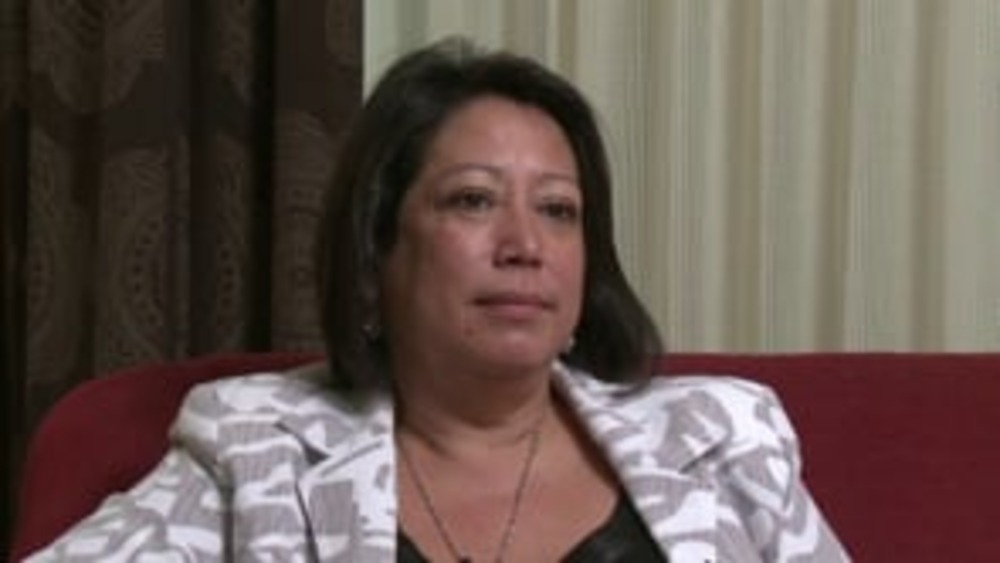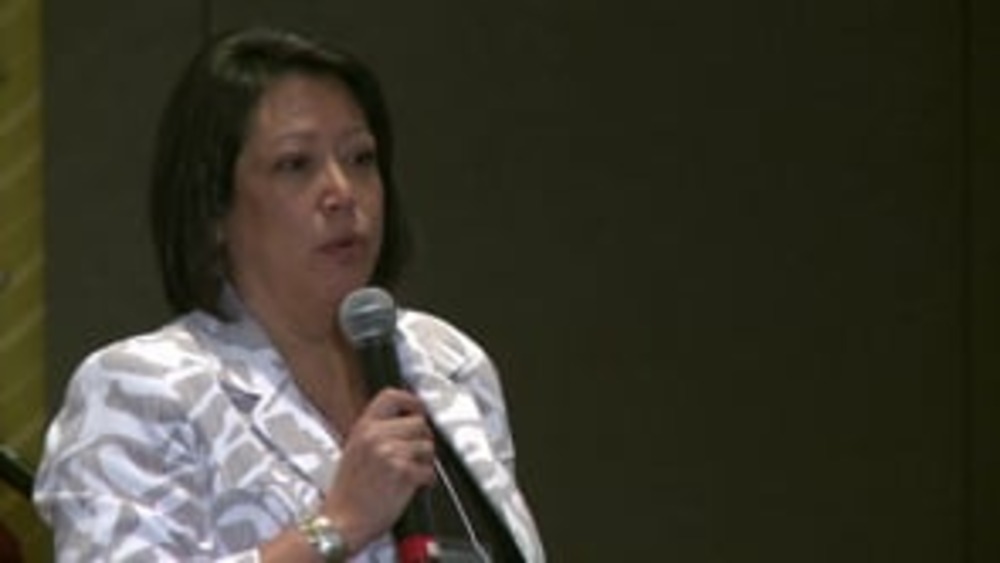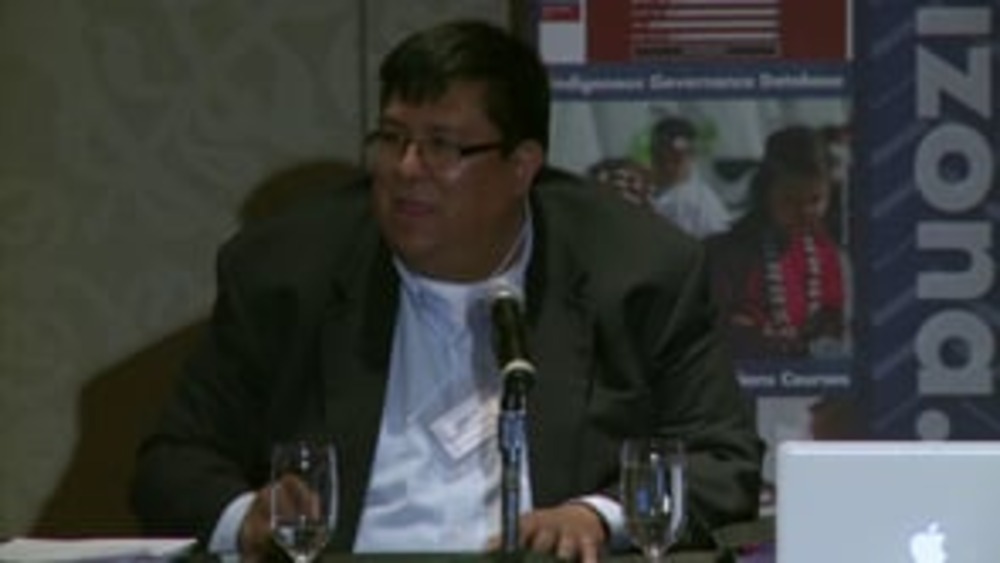Presenters Anthony Hill and Angela Wesley field questions from the audience about the approaches their nations took to constitutional reform.
Additional Information
Hill, Anthony and Angela Wesley. "The Process of Constitutional Reform: The Challenge of Citizen Engagement." Tribal Constitutions Seminar. Native Nations Institute of Leadership, Management, and Policy, University of Arizona. Tucson, Arizona. April 4, 2013. Q&A Session.
Transcript
Stephanie Cobenais:
"I'm Stephanie Cobenais, Red Lake Nation. Just one quick question for Angela: you said you guys did one-on-one --did you give incentives for the people to participate?"
Angela Wesley:
"Not direct, like it wasn't... that's not how we drew people in, but we tried to incorporate a lot of things when we met with our people in all different ways and a lot of it is the kind of things that are being done here is just door prizes, showing people that you appreciate them coming out. We didn't have a lot of money or a lot of budget to be able to be paying people to come out, so we tried to do other things that would compensate for their time and show people that we valued their time. So we would feed people really well, we would bring some of our drummers and dancers out and we would have...not just business, but we would also have the opportunity to share some culture while we were out. We would feed people well, give little door prizes and those kind of things, offer childcare so that children could be looked after and entertained while people are there participating. So we didn't...in general we didn't pay people to come to meetings but we did try to reach out as much as we could directly."
Audience Member:
"In regard to the Gila River and the coordinator positions, what again was the compensation involved? Ian [Record] had emphasized again that whatever commission be well-funded. What is the rule of thumb for compensation, the size of staff, how long and also how do you separate that funding so that it's not how do you say driven by politics?"
Judge Anthony Hill:
"The coordinator position I don't know the exact amount. If you can get me your information I can probably find that out because we did have a budget every year. The amount of staff, I think...the key point of that I think, hopefully everyone goes away with this, that you need outside lawyers to help you. I didn't get to this in my presentation, but eventually because things were fizzling out, they cut the funding off for the lawyer. So we had to utilize our general counsel for the tribe and of course the general counsel for the tribe in their office has their own interests in mind. They don't have the interests of the people; they have their own interests in looking out for their clients, who are the council. So it ended up, we ended up fighting with the lawyer who was supposed to be helping us. Regarding the level of staff, you need to remember that the commission members or the task force members, whatever you want to call them, that's not going to be their full-time job. You're going to need someone in a position where they're able to organize the meetings, do the paperwork and things like that. I thought we had a good staff with the project coordinator and the administrative assistant. Regarding the budget, it was almost...it was always political, because obviously our tribe operates on a year-to-year funding basis and we were always having to go to the council and ask for the money every year and then eventually, like I said, towards the end they just started cutting the funding because they said we were taking too long and things like that. So we...at the beginning it was free of politics because everyone was behind it and at the end it got all tangled up in politics. So I don't think there's any way that you can get the funding out of the politics because it's part of the overall budget of the tribe."
Ian Record:
"Any other questions? One interesting thing I wanted to share with you that Anthony shared with me is, and actually Jill [Doerfler] and I were talking about this yesterday, is there really isn't any such thing as a failed reform effort. I think you would concur, Anthony, that no matter the outcome of this current effort, you've increased, enhanced the baseline understanding and interest in your own constitution and the importance of thinking about that. So that the next time you do convene a new effort, you'll start it sort of at a higher place, I guess you could say."
Judge Anthony Hill:
"Oh, absolutely, and the people remember it because they were such a part of it at the beginning. They always come and ask me, "˜Well, where is it? What happened to the input that we gave?' And I always tell them the truth. I'm always honest about it. But they remember it and they kind of shake their heads when they hear what happened to it, because what ends up happening is it makes them want to hold those council people accountable when it comes election time. And I'm not...it's been two years, I don't know if it's had any impact on whether those who were against the reform were turned out of office. I've never really looked at it. But they still ask about it. They thought there were a lot of good ideas within it and they would like to still see them implemented. Again, my hope is, it's hopefully not all a lost cause because the promise, it's just a promise, is that we're going to go back to the full draft and it'll go to the people eventually. The council just felt that by taking the Secretarial election out, you removed the biggest obstacle. Why they didn't do that at the beginning I don't know, but that's the way the cookie crumbles."
Audience member:
"If I can add another question: What is the size and kind of the appropriateness of planning and legitimacy of planning in your structures, your government structures? Do you guys have robust planning departments and does that like have already community involvement? Is it something the community's familiar with? And also, kind of the underlying infrastructures, do you follow like long-term plans, land-use plans, ordinances and the like?"
Angela Wesley:
"Thank you. One of the things that has been new for us under treaty in particular having additional lands, is the land management component and resource management component. So that's something that we've been planning for and knew that it was coming, but it's probably one of the biggest new parts of our government that we're getting to know. We're very fortunate to have some people in our community that are so tied to the land and fit into those kind of roles quite well in planning for the effective day of our treaty. We actually did a lot of that work, we did a lot of the comprehensive community planning, land-use planning and that to prepare ourselves for what was coming forward. It is a struggle because it's a whole new area for us, but we definitely have been focusing on putting plans in place and did those with a lot of community input as well. We actually brought the maps out to people, gave them pens, told them to draw things on the map in terms of what they wanted for the future. We have...we had the good fortune actually of having a young man who was trained in forestry technology and had moved into GIS training as well, so he came in and became part of our lands department as well. So planning has been a big component of us moving forward."
Judge Anthony Hill:
"From the Gila River perspective, one of the good things they did was they recognized that with the constitutional change there was going to be changes in the structure of the government and a lot of people recognized that the current government structure, there was a lot of things wrong with it and what they did is they sort of put it on a parallel track to constitutional revision was reorganizing the government and that's a real...a lot of people think that's a sexy term, reorganizing the government. Is it like moving the deck chairs around on the deck of the Titanic? I don't know, but what the community did was they engaged Arizona State University to come in and look at the structure of the government and then based on the way the constitution was going to go, the government would be restructured in accordance with the new constitution, which would basically be a three-branch government. Unfortunately, what also happened with that is that also stalled as well. There were some...some of the initiatives that were implemented, reorganizing departments, putting them under what we call community managers under the executive branch or the guise of the executive branch, but beyond that there really hasn't been any change. You still have an organizational chart that's all over the place. And so unfortunately, that was a good intention, but like the constitution it kind of just stalled as well."



